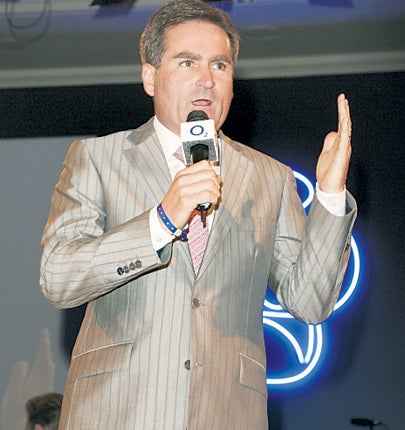Brian Viner: Prehistoric maybe, but I'll miss Gray and Keys
It's easy to forget that duo's pioneering work with Sky took football into the future

Your support helps us to tell the story
From reproductive rights to climate change to Big Tech, The Independent is on the ground when the story is developing. Whether it's investigating the financials of Elon Musk's pro-Trump PAC or producing our latest documentary, 'The A Word', which shines a light on the American women fighting for reproductive rights, we know how important it is to parse out the facts from the messaging.
At such a critical moment in US history, we need reporters on the ground. Your donation allows us to keep sending journalists to speak to both sides of the story.
The Independent is trusted by Americans across the entire political spectrum. And unlike many other quality news outlets, we choose not to lock Americans out of our reporting and analysis with paywalls. We believe quality journalism should be available to everyone, paid for by those who can afford it.
Your support makes all the difference.With scarcely any let-up in the sound and the fury directed at Andy Gray and Richard Keys, and adjectives such as "antediluvian", "prehistoric", and "boorish" continuing to reverberate, the pioneering work they represented as the two most visible frontmen for Sky's football coverage these last 20 years, not to mention their own talents as broadcasters, has been rather wilfully overlooked.
It is difficult now to recall what the televising of our national game was like before Sky Sports arrived on the scene, promptly introducing all kinds of add-ons now taken completely for granted, such as the scoreline and clock in the corner of the screen. It took a while, but eventually the BBC and ITV were shaken out of a technological lethargy by Sky, realising that they needed a little clock too, and even more importantly had to increase the number of cameras at live matches, or else risk looking, well, antediluvian and prehistoric.
On 24 April, 1991, Gray and Keys presented Sky Sports' inaugural live game: Rangers v Dundee United. In the two decades since, they have embraced any number of bells and whistles intended to keep Sky's coverage of football more comprehensive than anyone else's. And it's not as though Gray was simply the conduit for other people's innovations; it was his own enthusiastic explanation of tactics, using pepper pots and salt cellars after dinner in a Glasgow hotel one evening, more than six months before Sky Sports went on air, from which those early graphics were born.
All the same, the real wizards were behind the scenes. On Monday Night Football in August 1995, Tony Yeboah's stunning goal for Leeds United against Liverpool was precisely measured for speed and distance using, for the first time, an innovation borrowed from Israeli missile technology. With devices like that at his disposal, Gray was like Harry Potter after a visit to Diagon Alley. And invariably alongside him was his Ron Weasley, Richard Keys, appearing to understand every stroke of the telestrator, a kind of space-age pen used to draw lines across the pitch.
In truth, Gray's souped-up analysis could sometimes pall. But in his relentless appliance of science at least he never committed the worst crime of football punditry, that of stating the bleeding obvious, as embodied by the BBC's Alan Shearer.
Of course, some viewers, and more particularly non-viewers, have consistently refused to see Sky as anything other than a malign influence on football, filling the coffers of already rich clubs to create a self-perpetuating elite known, at least before Manchester City struck oil, as the "Sky Four". Those critics will have enjoyed this week's imbroglio. Personally, I don't mind admitting that I will miss the Gray-Keys double act.
Plainly, though, it couldn't go on. In an interview last August, Gray said with characteristic hyperbole that he was more excited by the forthcoming football season than he had ever been. "After nearly 20 years, we must be doing something right," he added, of himself and Keys. That they never did quite chalk up 20 years was, ironically, because they did something wrong.
Join our commenting forum
Join thought-provoking conversations, follow other Independent readers and see their replies
Comments